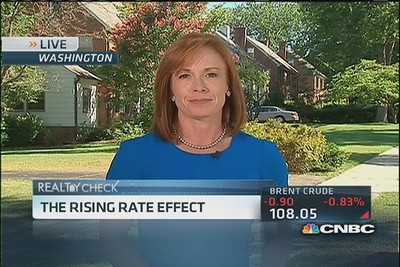Higher mortgage rates may mean easier credit
 By: Diana Olick | CNBC Real Estate
Reporter
By: Diana Olick | CNBC Real Estate
Reporter
As mortgage rates rise and refinancings fall dramatically, banks are in
search of new business. That, in turn, has them easing lending standards for
some borrowers, according to a new monthly survey from the Mortgage Bankers
Association.
Credit availability rose 2 percent in July and is up 3 percent from May, when interest rates began their climb, according to the MBA index.
"The increase was primarily driven by increases in product offerings that allow cash-out refinancing, and some increase in offerings for borrowers with higher LTVs, or lower credit scores," according to the report.
Credit availability rose 2 percent in July and is up 3 percent from May, when interest rates began their climb, according to the MBA index.
"The increase was primarily driven by increases in product offerings that allow cash-out refinancing, and some increase in offerings for borrowers with higher LTVs, or lower credit scores," according to the report.
(Read more: Mortgage delinquencies suddenly spike)
It is likely no coincidence that standards are easing as rates rise and mortgage applications fall. Total mortgage applications were down 47 percent last week from a year ago. Refinances, which had been the banks bread and butter during the housing crash, are down 59 percent from a year ago. Applications to purchase a home are up just 5 percent.
"People see interest rates rise, they slow down some of that eagerness to get into the market," said David Stevens, CEO of the Mortgage Bankers Association in an interview on CNBC's "Squawk Box."
(Read more: Map: Tracking the US real estate recovery)
Credit standards tightened dramatically over the past several years, as loose credit was largely blamed for the crash in housing. Average borrower credit scores on new loans are dramatically higher today, and lenders require larger down payments.
Even the FHA, the government mortgage insurer, which was created to help lower creditworthy borrowers, has raised its standards as well as its insurance premiums. Many lenders have overlays to their guidelines that they add on top of standard conventional guidelines. They could do that because refinances were so high, they needed to slow the volume in order to process all the loans.
It is likely no coincidence that standards are easing as rates rise and mortgage applications fall. Total mortgage applications were down 47 percent last week from a year ago. Refinances, which had been the banks bread and butter during the housing crash, are down 59 percent from a year ago. Applications to purchase a home are up just 5 percent.
"People see interest rates rise, they slow down some of that eagerness to get into the market," said David Stevens, CEO of the Mortgage Bankers Association in an interview on CNBC's "Squawk Box."
(Read more: Map: Tracking the US real estate recovery)
Credit standards tightened dramatically over the past several years, as loose credit was largely blamed for the crash in housing. Average borrower credit scores on new loans are dramatically higher today, and lenders require larger down payments.
Even the FHA, the government mortgage insurer, which was created to help lower creditworthy borrowers, has raised its standards as well as its insurance premiums. Many lenders have overlays to their guidelines that they add on top of standard conventional guidelines. They could do that because refinances were so high, they needed to slow the volume in order to process all the loans.
"As volumes slow, it makes sense that originators might ease some of their
overlays as they now have the additional bandwidth to focus on slightly
lower-quality loans or those loans that require more intense underwriting prior
to approval, such as loans for self-employed individuals or investors that own
multiple homes," said Craig Strent, CEO of Maryland-based Apex Home Loans.
"Competition for loans, particularly for home purchases, will continue to rise as refinances wane and originators look for continued loan volume to support the infrastructure they put in place during the recent refinance wave."
(Read more: Home builders boost prices)
Banks have already begun laying off workers in their mortgage departments, as refinance volume slows. Purchase applications are higher, but as rates rise, home sales are slowing. The easing is likely taking place on smaller loans that carry less risk for banks.
Just a few years ago, customers were complaining that banks were not processing loan applications fast enough. Banks had responded that they were swamped with business.
—By CNBC's Diana Olick. Follow her on Twitter @Diana_Olick.
Questions?Comments? facebook.com/DianaOlickCNBC
"Competition for loans, particularly for home purchases, will continue to rise as refinances wane and originators look for continued loan volume to support the infrastructure they put in place during the recent refinance wave."
(Read more: Home builders boost prices)
Banks have already begun laying off workers in their mortgage departments, as refinance volume slows. Purchase applications are higher, but as rates rise, home sales are slowing. The easing is likely taking place on smaller loans that carry less risk for banks.
Just a few years ago, customers were complaining that banks were not processing loan applications fast enough. Banks had responded that they were swamped with business.
—By CNBC's Diana Olick. Follow her on Twitter @Diana_Olick.
Questions?Comments? facebook.com/DianaOlickCNBC

Immediate payday loans no credit check are small term advances and can be used for more than just emergencies or daily needs. A small business plan held back for monetary reasons can be put into action through requesting loan from a no credit check loans lenders.
ReplyDeleteloans in 1 hour uk
short term loans over 6 months
12 month quick loans